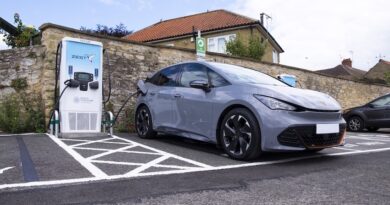5 Things to Consider Before Buying a Used Electric Vehicle
Thinking about buying a used electric vehicle (EV)? It’s a smart move for many of us aiming to go green while saving some cash. But before jumping in, there are key factors worth considering to ensure your choice is both economical and efficient.
From understanding battery life nuances to evaluating the local charging infrastructure, making an informed decision can mean peace of mind later on. Plus, considerations around maintenance costs and warranty transfers can keep you from unexpected expenses down the road.
Read along as we explore these aspects further to make purchasing pre-owned EVs easier!
1. Assessing Market Value Conservation for Second-Hand EVs
When buying a used electric vehicle, understanding its market value conservation is crucial. Pre-owned EVs often retain their value well, especially when bought from reliable sources. EchoPark exemplifies this by emphasizing quality and reliability in their offerings.
Considerations include vehicle age, brand reputation, and condition. For example, low mileage second-hand EVs in Houston can present an excellent opportunity for long-term investment.
Such vehicles not only promise lower depreciation but also come with the assurance of reliability when purchased from reputable dealerships like EchoPark.
They ensure thorough inspections and certifications that reassure buyers of their choices’ soundness. Evaluating these factors helps you gauge how your pre-owned electric vehicle will hold its worth over time while aligning with sustainable transport goals.
2. Understanding Battery Life and Its Impact
Battery life stands as a pivotal factor when choosing a used electric vehicle. Here’s why it matters:
- Age of the Battery: Older batteries may show diminished range, impacting daily usability.
- Battery Health Reports: Review these for insights into current capacity versus original specifications.
- Manufacturer Reputation: Some brands offer more durable battery technology. It’s wise to research different models.
Understanding warranty coverage is essential. Many EVs come with separate battery warranties, often extending longer than standard vehicle warranties.
Another critical aspect is replacement cost. Knowing potential expenses associated with battery replacements aids in long-term planning and financial forecasting.
By considering these elements thoughtfully, buyers make informed decisions about their EV’s viability over time, ensuring both efficiency and sustainability align with ownership goals without surprises.
3. Evaluating Charging Infrastructure in Your Area
Assessing local charging infrastructure is vital for a seamless EV experience. Consider how accessible public charging stations are, especially if home charging isn’t an option. Locations with numerous options support spontaneous travel without anxiety over finding the next charge point.
Recent EV charging trends show a shift toward more convenient and faster solutions, reducing time spent at stations. Investigate whether your area follows these advancements to ensure you can leverage the latest technology.
Explore incentives offered by utilities or local governments encouraging the installation of residential chargers, which add convenience and potential cost savings. The proximity to these resources directly impacts the practicality of owning an electric vehicle.
Having this information upfront enables confident decisions regarding where to recharge efficiently, ensuring your daily commute remains smooth while keeping sustainability goals within reach.
4. Calculating Maintenance Costs for Used EVs
Understanding the maintenance costs associated with a used electric vehicle is crucial to budgeting. Here’s what you need to consider:
- Fewer Moving Parts: EVs generally have fewer components than traditional vehicles, potentially reducing repair costs.
- Regular Software Updates: Some models require periodic updates, which can be managed remotely or during service appointments.
Research typical expenses related to tire wear and brake replacements. Regenerative braking systems in many EVs extend the life of brakes compared to conventional cars.
Check if any specific maintenance needs exist due to manufacturer recommendations or recall notices. Knowing these details helps forecast potential expenditures.
By understanding these factors, buyers can better plan for ongoing ownership costs while enjoying benefits like lower fuel expenses and contributing positively toward environmental goals.
5. The Importance of Warranty Transfers in Pre-Owned Vehicles
Warranty transfers hold significant value when purchasing a pre-owned electric vehicle. They offer reassurance about potential repair costs, particularly with high-value components like the battery and drivetrain. Understanding what aspects remain under warranty helps protect against unexpected expenses.
Verify if the original manufacturer’s warranty extends to subsequent owners, as this varies between brands. Many warranties require proper documentation for seamless transfer during resale, making it crucial to secure all necessary paperwork from previous owners or dealers.
Extended warranties often serve as an additional layer of security, covering areas standard agreements might miss. They can mitigate risks associated with owning a used EV by handling complex repairs that arise beyond typical maintenance tasks.
Grasping these factors ensures confidence in your purchase while protecting financial investments over time through well-informed decisions.
Summing Up Your Used EV Purchase Decisions
Choosing a used electric vehicle involves thoughtful consideration of several factors. Understanding battery life and charging infrastructure ensures your car meets daily needs efficiently. Calculating maintenance costs, including potential software updates and part replacements, aids in accurate budgeting.
Warranty transfers add security against unforeseen repairs, safeguarding your investment. Assessing market value conservation helps gauge long-term viability. By carefully evaluating these elements, you can confidently make a smart decision that aligns with financial and environmental goals.






